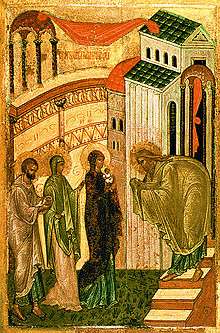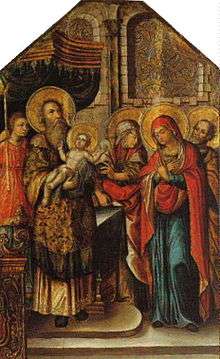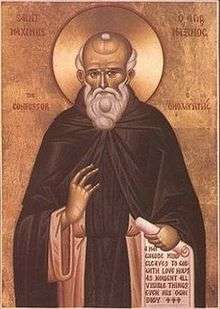February 2 (Eastern Orthodox liturgics)
February 1 - Eastern Orthodox liturgical calendar - February 3
All fixed commemorations below are observed on February 15 by Eastern Orthodox Churches on the Old Calendar.[note 1]
For February 2nd, Orthodox Churches on the Old Calendar commemorate the Saints listed on January 20.
Feasts
- The Presentation of our Lord, God and Savior Jesus Christ in the Temple (also The Meeting of the Lord, or Hypapante), 40 days after His sacred birth.[1][2][3][4][5][6][note 2]
Saints
- Martyr Agathadorus of Tyana in Cappadocia.[1][3][8]
Pre-Schism Western saints
- Saint Apronian, a Roman executioner who converted to Orthodoxy when taking the martyr St Sisinnius before the tribunal and was then himself martyred (c. 304)[9][note 3]
- Saint Flosculus (Flou), Bishop of Orleans in France (c. 480)[7][9]
- Saint Laurence of Canterbury, the second Archbishop of Canterbury (619)[7][9][10][11][note 4] (see also: February 3 - East)
- Saint Adalbert I of Ostrevent (Adalbald), founder of Marchiennes Abbey (652)[9][12][note 5]
- Saint Feock, a saint recalled by a church dedication in Cornwall.[9]
- Saint Adeloga (Hadeloga), a daughter of Charles Martel, first Abbess of Kitzingen in Germany (c. 745)[9][13][note 6]
- Martyrs of Ebsdorf, martyred at the Battle of Luneberg Heath near Ebsdorf, Saxony (880)[9][14][note 7]
- Saint Marquard, Bishop of Hildesheim, martyred with others at Ebsdorf in Germany (880)[9]
- Saint Theodoric, third Bishop of Minden, martyred with others at Ebsdorf in Germany (880)[9][15]
- Saint Columbanus, born in Ireland, he lived as a hermit near the church of Saint-Bavo in Ghent in Belgium (959)[9][16]
Post-Schism Orthodox saints
- New Martyr Jordan of Trebizond, at Constantinople (1650)[1][3][17]
- New Hieromartyr Gabriel, Hierodeacon, of Constantinople (1676)[1][3][18]
- Venerable Anthimos (Vagianos) of Chios (1960)[1][5] (see also: February 15 - Greek)
- Venerable Ekvtime (Kereselidze) the Confessor, of Georgia (1944)[19][note 8] (see also: January 20 - Slavonic)
Other commemorations
- Repose of Schema-monk Seraphim of Valaam Monastery (1860)[1]
Icons
- Synaxis of the Icon of the Theotokos the Hypapante of Kalamata, patron saint of Kalamata.[20]
- Synaxis of the Icon of the Theotokos "Apekois" (Ypakoe), at the Church of the Hypapante on Kalymnos.[21]
- Synaxis of the Icon of the Theotokos "Dreadful Bee", at Leivadi on Kythira.[22][note 9]
- Synaxis of the Icon of the Theotokos of Goumenissa.[23] (see also: August 17)
- Synaxis of the Icon of the Theotokos "'Flevariotissa' or 'Libya'",[note 10] at Mesaria on the island of Astypalaia.[24]
- Synaxis of the Icon of the Theotokos "Flevariotissa",[note 11] at Ampelakia on Salamis Island.[25]
- Synaxis of the Icon of the Theotokos "Chrysaliniotissa",[note 12] in Leukosia, Cyprus.[26]
Icon gallery
 The Presentation of our Lord, God and Savior Jesus Christ in the Temple.
The Presentation of our Lord, God and Savior Jesus Christ in the Temple. The Presentation of our Lord, God and Savior Jesus Christ in the Temple.
The Presentation of our Lord, God and Savior Jesus Christ in the Temple. The Presentation of our Lord.
The Presentation of our Lord.
Notes
- The notation Old Style or (OS) is sometimes used to indicate a date in the Julian Calendar (which is used by churches on the "Old Calendar").
The notation New Style or (NS), indicates a date in the Revised Julian calendar (which is used by churches on the "New Calendar"). - "THE Purification of the Blessed Virgin Mary, called by the Greeks Hypapante (meeting) of the Lord."[7]
- "At Rome, on the Salarian road, the passion of St. Apronian, a notary. Whilst he was yet a Gentile, and was leading St. Sisinius out of prison, to present him before the governor Laodicius, he heard a voice from heaven saying, "Come ye, the blessed of my Father, possess the kingdom prepared for you from the beginning of the world." At once he believed, was baptized, and after confessing our Lord, received sentence of death."[7]
- Sent by St Gregory the Great to England, St Augustine sent him back to Rome to report on the English mission and to bring more help. The second Archbishop of Canterbury from 604, he suffered during the pagan reaction and thought of fleeing to France. He was rebuked by the Apostle Peter in a dream and in the end succeeded in converting Eadbald.
- Born in Flanders in Belgium, he was a son or grandson of St Gertrude of Hamage. He married a lady named Rictrude, who is also venerated as a saint together with their four children, Maurontius, Clotsindis, Eusebia and Adalsindis. Adalbald was murdered by relatives of his wife who disapproved of the marriage and he was venerated as a martyr.
- See: (in German) Hadeloga von Kitzingen. Wikipedia. (German Wikipedia).
- In 880 a Christian army was caught in the ice and snow and was defeated by pagan Norsemen at Ebsdorf in the north of Germany. Among them, St Bruno and four bishops, eleven nobles and many others were slain and venerated as martyrs.
- See also:
- (in Georgian) ექვთიმე აღმსარებელი (კერესელიძე). (Georgian Wikipedia).
- (in Russian) Евфимий Исповедник (Кереселидзе). Википедии. (Russian Wikipedia).
- Greek: Κακιᾶς Μέλισσας.
The icon has this epithet because during a raid of the island by pirates, who wished to plunder the monastery, a colony of bees suddenly appeared that attacked the pirates and forced them to retreat. - Greek: Φλεβαριωτίσσης ἢ Λιβύης.
She is called this because of the dark colour. - Greek: Φλεβαριώτισσας.
She is called this either because the feast day is in the month of February, or according to another tradition, because a vein (Greek: φλέβα) of water had been discovered in this area. - Greek: Χρυσαλινιώτισσας' ἢ 'Ἀλινιώτισσας.
gollark: Got any players *now*?
gollark: ™
gollark: Exactly.
gollark: <@!202992030685724675> Got 15 players yet?
gollark: HÆĦÆĦÆĦÆĦÆĦÆ
References
- February 2 / 15. Orthodox Calendar (Pravoslavie.ru).
- Great Synaxaristes: (in Greek) Ἡ Ὑπαπαντὴ τοῦ Κυρίου καὶ Θεοῦ καὶ Σωτῆρος ἡμῶν Ἰησοῦ Χριστοῦ. 2 Φεβρουαρίου. Μεγασ Συναξαριστησ.
- (in Greek) Συναξαριστής. 2 Φεβρουαρίου. Ecclesia.gr. (H Εκκλησια Τησ Ελλαδοσ).
- The Meeting of our Lord and Savior Jesus Christ in the Temple. OCA - Lives of the Saints.
- February 15 / 2. Holy Trinity Russian Orthodox Church (A parish of the Patriarchate of Moscow).
- Rev. Sabine Baring-Gould (M.A.). "The Purification of S. Mary, or the Presentation of Christ in the Temple." In: The Lives of the Saints. Volume the Second: February. London: John C. Nimmo, 1897. pp. 34-37.
- The Roman Martyrology. Transl. by the Archbishop of Baltimore. Last Edition, According to the Copy Printed at Rome in 1914. Revised Edition, with the Imprimatur of His Eminence Cardinal Gibbons. Baltimore: John Murphy Company, 1916. pp. 35–36.
- Great Synaxaristes: (in Greek) Ὁ Ἅγιος Ἀγαθόδωρος ὁ Μάρτυρας. 2 Φεβρουαρίου. Μεγασ Συναξαριστησ.
- February 2. Latin Saints of the Orthodox Patriarchate of Rome.
- Rev. Richard Stanton. A Menology of England and Wales, or, Brief Memorials of the Ancient British and English Saints Arranged According to the Calendar, Together with the Martyrs of the 16th and 17th Centuries. London: Burns & Oates, 1892. pp. 46-48.
- Rev. Sabine Baring-Gould (M.A.). "& Laurence, Abp. of Cantebury. (A.D. 619.)." In: The Lives of the Saints. Volume the Second: February. London: John C. Nimmo, 1897. pp. 39-41.
- Rev. Sabine Baring-Gould (M.A.). "S. Adalbald, C. (About A.D. 652.)." In: The Lives of the Saints. Volume the Second: February. London: John C. Nimmo, 1897. p. 41.
- Rev. Sabine Baring-Gould (M.A.). "S. Adeloga, V. Abss. (8th Cent.)." In: The Lives of the Saints. Volume the Second: February. London: John C. Nimmo, 1897. pp. 42-44.
- Rev. Sabine Baring-Gould (M.A.). "The Holy Martyrs of Ebbecksdorf. (A.D. 880.)." In: The Lives of the Saints. Volume the Second: February. London: John C. Nimmo, 1897. p. 45.
- The Martyrs of Ebsdorf
- Very Rev. John O'Hanlon. "Article I. — St. Columban, Abbot and Recluse, at Ghent, Belgium. [Tenth Century]." In: Lives of the Irish Saints: With Special Festivals, and the Commemorations of Holy Persons. Vol. II. Dublin, 1875. pp. 246-249.
- Great Synaxaristes: (in Greek) Ὁ Ἅγιος Ἰορδάνης ὁ Νεομάρτυρας. 2 Φεβρουαρίου. Μεγασ Συναξαριστησ.
- Great Synaxaristes: (in Greek) Ὁ Ἅγιος Γαβριὴλ ὁ Ὁσιομάρτυρας. 2 Φεβρουαρίου. Μεγασ Συναξαριστησ.
- Great Synaxaristes: (in Greek) Ὁ Ὅσιος Εὐθύμιος ἐκ Γεωργίας. 2 Φεβρουαρίου. Μεγασ Συναξαριστησ.
- Great Synaxaristes: (in Greek) Σύναξις Ὑπεραγίας Θεοτόκου τῆς Ὑπαπαντῆς. 2 Φεβρουαρίου. Μεγασ Συναξαριστησ.
- Great Synaxaristes: (in Greek) Σύναξις Ὑπεραγίας Θεοτόκου τῆς Ἀπεκοῆς. 2 Φεβρουαρίου. Μεγασ Συναξαριστησ.
- Great Synaxaristes: (in Greek) Σύναξις Ὑπεραγίας Θεοτόκου τῆς Κακιᾶς Μέλισσας. 2 Φεβρουαρίου. Μεγασ Συναξαριστησ.
- Great Synaxaristes: (in Greek) Σύναξις Ὑπεραγίας Θεοτόκου τῆς Γουμενίσσης. 2 Φεβρουαρίου. Μεγασ Συναξαριστησ.
- Great Synaxaristes: (in Greek) Σύναξις Ὑπεραγίας Θεοτόκου τῆς Φλεβαριωτίσσης ἢ Λιβύης. 2 Φεβρουαρίου. Μεγασ Συναξαριστησ.
- Great Synaxaristes: (in Greek) Σύναξις Ὑπεραγίας Θεοτόκου τῆς Φλεβαριωτίσσης. 2 Φεβρουαρίου. Μεγασ Συναξαριστησ.
- Great Synaxaristes: (in Greek) Σύναξις Ὑπεραγίας Θεοτόκου τῆς Χρυσαλινιωτίσσης. 2 Φεβρουαρίου. Μεγασ Συναξαριστησ.
Sources
- February 2 / 15. Orthodox Calendar (Pravoslavie.ru).
- February 15 / 2. Holy Trinity Russian Orthodox Church (A parish of the Patriarchate of Moscow).
- February 2. OCA - The Lives of the Saints.
- The Autonomous Orthodox Metropolia of Western Europe and the Americas. St. Hilarion Calendar of Saints for the year of our Lord 2004. St. Hilarion Press (Austin, TX). p. 12.
- The Second Day of the Month of February. Orthodoxy in China.
- February 2. Latin Saints of the Orthodox Patriarchate of Rome.
- The Roman Martyrology. Transl. by the Archbishop of Baltimore. Last Edition, According to the Copy Printed at Rome in 1914. Revised Edition, with the Imprimatur of His Eminence Cardinal Gibbons. Baltimore: John Murphy Company, 1916. pp. 35–36.
- Rev. Richard Stanton. A Menology of England and Wales, or, Brief Memorials of the Ancient British and English Saints Arranged According to the Calendar, Together with the Martyrs of the 16th and 17th Centuries. London: Burns & Oates, 1892. pp. 46-48.
Greek Sources
- Great Synaxaristes: (in Greek) 2 Φεβρουαρίου. Μεγασ Συναξαριστησ.
- (in Greek) Συναξαριστής. 2 Φεβρουαρίου. Ecclesia.gr. (H Εκκλησια Τησ Ελλαδοσ).
Russian Sources
- (in Russian) 15 февраля (2 февраля). Православная Энциклопедия под редакцией Патриарха Московского и всея Руси Кирилла (электронная версия). (Orthodox Encyclopedia - Pravenc.ru).
- (in Russian) 2 февраля по старому стилю / 15 февраля по новому стилю. Русская Православная Церковь - Православный церковный календарь на 2018 год.
This article is issued from Wikipedia. The text is licensed under Creative Commons - Attribution - Sharealike. Additional terms may apply for the media files.

